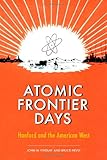Atomic Frontier Days: Hanford and the American West (Sick Series in Wester History and Biography)

It is easy to think about Hanford as an expression of federal power, a place apart from humanity and nature, but that view is a distortion of its history. Atomic Frontier Days looks through a wider lens, telling a complex story of production, community-building, politics, and environmental sensibilities. In brilliantly structured parallel stories, the authors bridge the divisions that accompany Hanford's headlines and offer perspective on today's controversies. Influenced as much by regional culture, economics, and politics as by war, diplomacy, and environmentalism, the story of Hanford and the Tri-Cities of Richland, Pasco, and Kennewick illuminates the history of the modern American West.
John M. Findlay is professor of history at the University of Washington. His focus is social and urban history. Bruce Hevly is associate professor of history at the University of Washington. His focus is history of science and technology.
"Atomic Frontier Days captures one of the most interesting and controversial places in the American West in all its surprising particularity. Technologically sophisticated, shrewd, at once analytically unflinching and generous, it belongs on the short list of books necessary to understand the West and its complicated relation to the nation." -Richard White, author of The Organic Machine
"This richly detailed study takes us beyond big government programs and corporate contracts to show people coping with the intricate dance of science and technology, warfare and welfare, the mess of making bombs and the business of cleaning up." -Virginia Scharff, Center for the Southwest, University of New Mexico